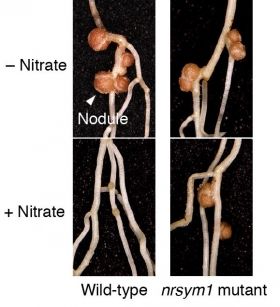In a study published in Nature Communications, researchers at the University of Tsukuba have now identified a key genetic pathway in the legume Lotus japonicus that controls nodulation in response to nitrogen levels in the soil.
Nitrogen is an essential element for all living organisms, as it is used to make the organic building blocks of life: DNA, RNA, and protein. For legumes, obtaining (or "fixing") nitrogen via nodules comes at a cost, because the plant needs to expend energy and resources to sustain the bacteria. Owing to this tradeoff, legumes must maintain a finely tuned balance of nodulation.
"Root nodules form in response to low soil levels of fixed nitrogen molecules like nitrate," lead author Hanna Nishida explains. "When the concentration of soil nitrate increases, legumes can respond by inhibiting root nodulation. The mechanism of this response was unknown, though, so our aim was to pinpoint how nitrate-dependent regulation happens in these plants."
Read more at University of Tsukuba
Image: This is a nodulation. (Credit: University of Tsukuba)


